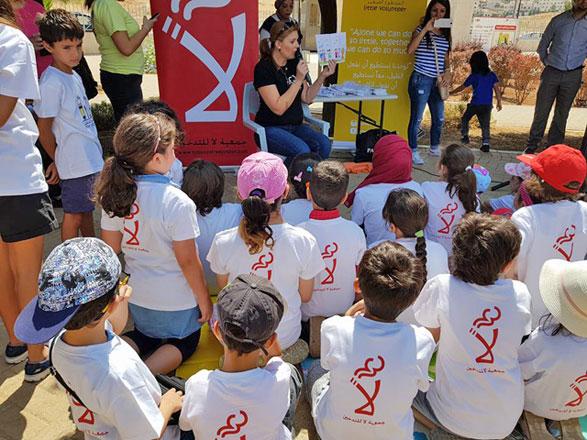You are here
Local activist group sparks movement towards smoke-less Jordan
By Macyn Hunn - Feb 21,2019 - Last updated at Feb 21,2019

In this undated photo, Larissa Al Wer, of Tobacco-Free Jordan, can be seen speaking to children during an event on the dangers of smoking (Photo courtesy of Zeina Shahzada)
AMMAN — Besides raising awareness on the dangers of smoking and protecting people’s right to breathe tobacco free air, Tobacco-Free Jordan said their primary mission is centred around ensuring full enforcement of the Public Health Law.
Tobacco-Free Jordan, or “La Lil Tadkheen” as they’re known in Arabic, is a group founded in 2011 by concerned mothers who originally wanted just one thing: to keep the children of Amman safe from second-hand smoke.
Larissa Al Wer, anti-tobacco activist and one of seven board members managing Tobacco-Free Jordan, said: “It all began at a birthday party. There were some women who insisted on smoking around the children and we decided something had to be done.”
“Betterment of public health is an admirable goal, but a difficult one to reach considering what the group is up against,” Wer said in a recent interview with The Jordan Times.
Recalling their very first public, non-smoking event on May 31, 2011, Wer said: “We did not pay for anything. Support was freely given and a lot of people, both locals and foreigners, participated.”
Wer said that the group continues to receive support for their events in the form of volunteers, free venues and funding from outside sources, but their main focus is to spread awareness about the risks of using tobacco and the effects of second-hand smoke. “Tobacco-Free Jordan regularly holds assemblies and talks at schools all around Amman in hopes of reaching the most at-risk people: kids.”
“It is amazing, once these kids hear our talks they actually go home and ask their parents not to smoke and explain the harmful effects of tobacco and nicotine,” Wer said.
She added that the group has freely distributed over 2,500 copies of their book, “My Smoke Free Life”, to schools and libraries all over the Kingdom which are read either by volunteers of the group or different NGOs involved with the same goal of increasing awareness of the risks of tobacco consumption.
Wer said that her anti-smoking group stands against tobacco products of all kinds, including chewing tobacco and argileh (water pipe), as well as the more recently developed e-cigarettes and Juuls. “These new Juuls are no less harmful than cigarettes and what is worse is that they are being marketed toward teenagers who think it is a safer choice [than cigarettes].”
When asked about Tobacco-Free Jordan’s biggest goal, Wer said: a full enforcement of the Public Health Law, which restricts smoking in public places. According to the Public Health Law, which is responsible for smoking regulations, most indoor places such as restaurants and cafes should have restricted smoking sections or, in some cases, not allow smoking.
“It is clear that these laws and restrictions are not being taken seriously by business owners due to either pressure from customers or a lack of consequences from the government.”
The Tobacco-Free Jordan group hopes to gain public support by changing the perception of smoking in public as they continue to spread awareness. “Once we have more public support, we can make real changes to how the law is implemented and enforced,” Wer said.
According to the Ministry of Health, an average of 3,400 cancer cases are reported annually in the country, a third of which are smokers.
The proportion of smokers climbs to 72 per cent among the 225 annual cases of lung cancer, according to official figures.
Health Ministry figures indicate that 52 per cent of Jordanian males over the age of 25 smoke, while the proportion of female smokers in the same age group is 18 per cent. Smokers make up 25 per cent of the male population aged 13-15 and 16 per cent of females in the same category.
Moreover, 37 per cent of the country’s doctors smoke, according to the ministry’s figures, which also indicate that a total of JD600 million is spent each year on tobacco products and the treatment of smoking-related diseases in the Kingdom.
It is estimated by health officials that about 3,100 Jordanians die each year from cigarette-related issues and that the number is rising.
Related Articles
AMMAN — Tobacco-Free Jordan, on Saturday launched a campaign against second-hand smoke in cooperation with a local media company, the
AMMAN — Smoking e-cigarettes, vapes, shisha (water pipe tobacco) and cigarettes has become a common trend among adolescents in Jordan, accor
AMMAN — The tobacco consumption rate among Jordanians is expected to reach 50 per cent by 2025, a matter that necessitates firmer implementa
















